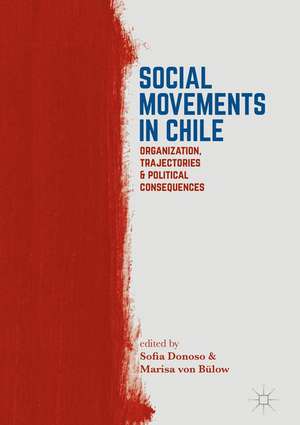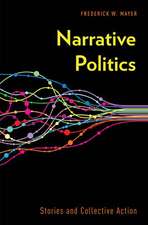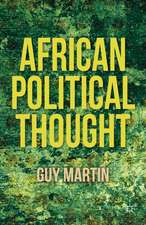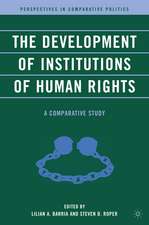Social Movements in Chile: Organization, Trajectories, and Political Consequences
Editat de Sofia Donoso, Marisa von Bülowen Limba Engleză Hardback – 10 feb 2017
| Toate formatele și edițiile | Preț | Express |
|---|---|---|
| Paperback (1) | 888.18 lei 6-8 săpt. | |
| Palgrave Macmillan US – 12 dec 2018 | 888.18 lei 6-8 săpt. | |
| Hardback (1) | 892.90 lei 6-8 săpt. | |
| Palgrave Macmillan US – 10 feb 2017 | 892.90 lei 6-8 săpt. |
Preț: 892.90 lei
Preț vechi: 1088.90 lei
-18% Nou
Puncte Express: 1339
Preț estimativ în valută:
170.87€ • 177.31$ • 142.82£
170.87€ • 177.31$ • 142.82£
Carte tipărită la comandă
Livrare economică 15-29 martie
Preluare comenzi: 021 569.72.76
Specificații
ISBN-13: 9781349950911
ISBN-10: 1349950912
Pagini: 288
Ilustrații: XV, 286 p. 7 illus., 3 illus. in color.
Dimensiuni: 148 x 210 x 23 mm
Greutate: 0.5 kg
Ediția:1st ed. 2017
Editura: Palgrave Macmillan US
Colecția Palgrave Macmillan
Locul publicării:New York, United States
ISBN-10: 1349950912
Pagini: 288
Ilustrații: XV, 286 p. 7 illus., 3 illus. in color.
Dimensiuni: 148 x 210 x 23 mm
Greutate: 0.5 kg
Ediția:1st ed. 2017
Editura: Palgrave Macmillan US
Colecția Palgrave Macmillan
Locul publicării:New York, United States
Cuprins
1. Introduction: Social movements in contemporary Chile.- 2. Shifting relationships between social movements and institutional politics.- 3. “Outsider” and “insider” strategies: Chile’s Student Movement, 1990-2014.- 4. From cooperation to confrontation: The Mapuche Movement and its political impact, 1990-2014.- 5. Democratizing the flows of democracy: Patagonia sin Represas in the awakening of Chile’s civil society.- 6. Feminism and gender policies in post-dictatorship Chile (1990-2010).- 7. Coping with neoliberalism through legal mobilization: the Chilean labor movement’s new tactics and allies.- 8. Chilean social movements and party politics in comparative perspective: Conceptualizing Latin America’s “third generation” of anti-neoliberal protest.- 9. Post-transition social movements in Chile in comparative perspective.
Notă biografică
Sofia Donoso is Adjunct Research Fellow at the Centre for Conflict and Social Cohesion Studies (COES) associated to the Universidad de Chile, and the Pontificia Universidad Católica de Chile. Her research has been published in the Journal of Latin American Studies, Research in Social Movements, Conflicts and Change, as well as in several book chapters in edited volumes. She holds an MPhil and a PhD from the University of Oxford.
Marisa von Bülow is Professor of Political Science at the Universidade de Brasília and a researcher at Pontificia Universidad Católica de Chile. She is the author of various books, among them Building transnational networks: Civil society and the politics of trade in the Americas, and Social Movement Dynamics: new perspectives on theory and research from Latin America. She has also published several articles on social movements in Mobilization, Latin American Politics and Society, and other journals.
Textul de pe ultima copertă
This book presents rich empirical analyses of the most important movements in Chile’s post-transition era: the Student Movement, the Mapuche Movement, the Labor Movement, the Feminist Movement, and the Environmental Movement. The chapters illuminate the processes that led to their emergence, and detail how actors developed new strategies, or revisited old ones, to influence the political arena. The book also offers contributions that situate these cases both in terms of the general trends in protest in Chile, as well as in comparison to other countries in Latin America. Emphasizing various facets of the debate about the relationship between “institutional” and “non-institutional” politics, this volume not only contributes to the study of collective action in Chile, but also to the broader social movement literature.
Caracteristici
Analyzes the development of the most visible social movements in Chile since 1990 Contributes to a growing literature on the relationship of social movements with the institutional terrain in the world Fills an important research gap in the study of collective action in Chile














